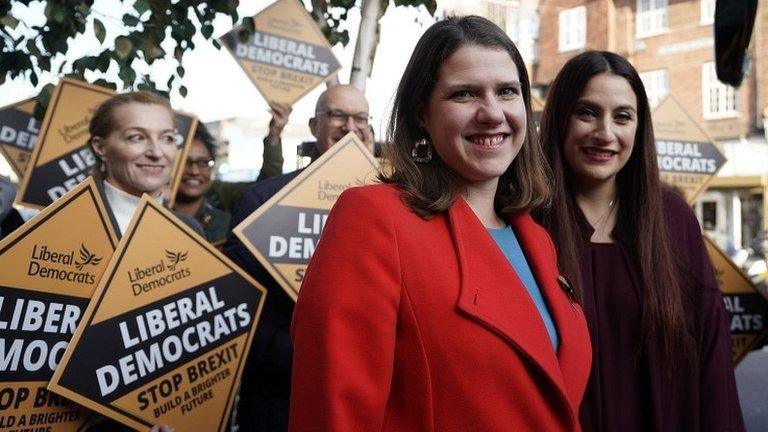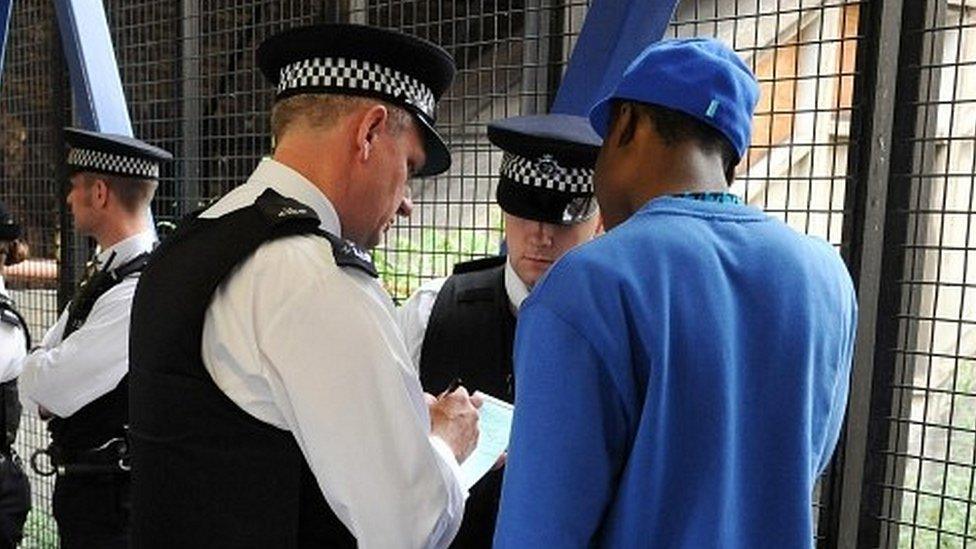General election 2019: Lib Dems 'to protect worshippers from attacks'
- Published

The Liberal Democrats have promised to protect places of worship from hate crimes and terror attacks if they win the general election.
The party is promising more funding for security - and also says it would bring in tougher sentences for hate crime.
The Remain-supporting party has been criticised for running candidates against other pro-EU politicians.
But Lib Dem health spokeswoman Luciana Berger said people wanting to stop Brexit "have to back" her party.
The Conservatives say they want to "get Brexit done" by 31 January, while Labour is promising another referendum after the election, on a revised deal it hopes to reach with the EU.
In other developments on Thursday:
The Conservatives are promising to cut "immigration overall" after Brexit
Labour says it will close the gender pay gap by 2030
Home Office figures released last month showed a 10% rise in hate crimes - offences motivated by hostility towards someone's race, religion, sexual orientation, disability or transgender identity - in England and Wales in 2018/19.
The Liberal Democrats say they will turn all such crimes into "aggravated offences", meaning maximum sentences would rise.
Currently, crimes committed for homophobic, disablist or transphobic reasons carry lower maximum jail times than those for aggravated by race or religion.

How many attacks are there on places of worship?
By BBC Reality Check
Hate crime statistics provide a breakdown of religiously motivated acts of criminal damage or arson, but these don't necessarily indicate whether they were on a place of worship.
These show that in 2018-19, there were roughly 850 reported cases of criminal damage - a rise from 570 five years ago.
Under 5% of these crimes resulted in someone being taken to court, lower than for other types of hate crime, such as assault.
The highest numbers of religious hate crimes are aimed at Muslims and Jews, who represent three-quarters of known victims.

Just under half of religious hate crime offences were targeted against Muslims in 2018/19, the Home Office said, and 18% were targeted against Jewish people.
The Lib Dems are promising more funding for security at places of worship, schools and community centres "vulnerable to hate crime and terror attacks".

The Lib Dems say the use of stop-and-search powers must change
The party says it wants "complete data" to be collected on the ethnicity of people going through the justice system, and an end to "disproportionate" use of stop-and-search powers by police on people from ethnic minorities.
It is pledging to ensure "equal marriage" for all, including allowing the Church of England and the Church of Wales to carry out same-sex weddings.
It wants to amend the Gender Recognition Act, so it no longer includes a requirement for medical reports to be submitted and recognises non-binary gender identities. Applicants for passports would be able to fill in an "X gender option" under its plans.
Ms Berger said: "Discrimination has no place in 21st century Britain. Unfortunately this is not the reality for too many in the UK."
Luciana Berger: "I went from being a Labour MP to being a Jewish MP"
She criticised Labour leader Jeremy Corbyn, for having "inexcusably failed to root out anti-Semitism" in the party and having "betrayed the values of equality and anti-racism against all". The Conservatives, Ms Berger added, were "encouraging ugly nationalism".
Mr Corbyn has described anti-Semitism as a "poison and and evil", adding that his party has taken action to root it out.
Earlier this week, the Conservatives expelled a number of members alleged to have posted Islamophobic content on social media, saying it would "never stand by when it comes to prejudice and discrimination".
Brexit divisions
The Lib Dems have entered a "Remain alliance" with the Green Party and Plaid Cymru in dozens of constituencies, meaning only the party with the best chance of a win will run in them.
Ms Berger, who quit Labour earlier this year and joined the Lib Dems in September, told BBC Radio 4's Today programme her old party had "refused to engage" in talks aimed at creating a wider anti-Brexit alliance.
The Lib Dems are still contesting the seat of Canterbury, in Kent, despite their candidate quitting this week, saying he did not want to divide the Remain vote between himself and an anti-Brexit Labour rival. He has since been replaced.
The Lib Dems are also fielding a candidate in South West Hertfordshire, where former Tory cabinet minister David Gauke - who was expelled from the Conservative parliamentary party after voting to block a no-deal Brexit - is running as an independent.
Ms Berger said: "I know and like David very, very much but, as I understand it, David would like a soft Brexit. People want a choice at this election."
For Labour, Mr Corbyn has said that, if he becomes prime minister, he would "get Brexit sorted" within six months, after getting a new deal with the EU and putting it to voters in a referendum.
Conservative leader Boris Johnson says his agreement is "oven-ready" and can get through Parliament if he wins a majority at the election.